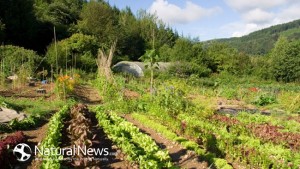
Organic gardening completely avoids the use of toxins, such as pesticides and fertilizers. Organic gardening strategies are often fairly inexpensive, and it’s fairly simple to do! If you decide to garden organically, you can invite your children to participate and help out. It teaches children about gardening and health, and strengthens the bond between you and your child. Keep your plants healthier by using aspirin water. Simply dissolve 3 aspirins in 4 gallons of water, and spray your plants with it if they become diseased. The process should be repeated bi-weekly to ensure top health for your plants in a safe, toxin-free way.
Creating a Sustainable Organic Garden
If you are preparing to create an organic garden, select a section that you’ll leave untouched. Wildlife, such as birds and insects, are necessary to allow your organic garden to thrive! The insects and birds that you need are often present on your property. Follow these tips to ensure that your garden can properly grow.
As your seeds begin to sprout, they require less warmth. Move them away from the heat source to keep them growing healthily. If you’ve been using plastic wrap to insulate them, it’d be about time to remove the wrap and give them time to breathe. Be sure to watch them closely to find the best times to do these movements and changes. Aerate your soil by hand each day by ruffling the dirt up. Your seedlings will grow larger.
Keep all of your tools together in an organized area to avoid having to look for them. If your tools are kept together in a specific area, you can easily find them as you need them. Be prepared to work by wearing a tool belt or a pair of jeans with plenty of pockets to hold everything you need to use as you work.
The Benefits of Coffee Grounds
Coffee grounds provide a number of benefits to your organic garden. Used coffee grounds give your soil a massive number of nitrogenous nutrients that will enrich your plants. Since herbs and other plants require nitrogen to thrive, providing an organic source through coffee grounds will let them grow faster.
Make a compost pile! These should be packed with a combination of green and dried plant mulch. You can use garden waste, like grass clippings, for the green material. You can incorporate cardboard, sawdust, dried wood and shredded paper to form the dried plant material. Never use carnivorous animal waste, diseased plants, ashes or charcoal meat to form your compost.
Use an old laundry basket to collect your harvest. Laundry baskets are perfect because they have plenty of holes, making it a huge strainer that you can use to clean off your produce. Rinse them thoroughly in the basket and let the water strain away through the holes.
Veggie Gardens
You can use brick, untreated wood or stone to create raised beds. Raised beds are excellent as they keep your plants protected. If you choose wood, choose a rot-resistant type that doesn’t contain chemicals. Don’t use treated wood as those chemicals can end up in your soil or plants. Organic gardening provides a number of great benefits including healthier foods and better plants.
You may also like: Grapefruit Seed Extract: Antibacterial | Antiviral | Antioxidant
Sources:Naturalnews.com
http://www.voxnature.com/eco-friendly/organic-gardening-techniques-youll-simply-love/
http://www.planetnatural.com/organic-gardening-guru/
http://www.voxnature.com/garden/keeping-your-garden-healthy/
Leave a Reply